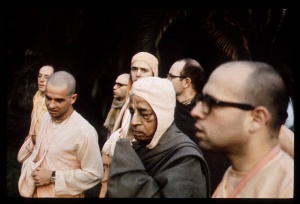SB 4.13.11: Difference between revisions
m (1 revision(s)) |
(Vanibot #0054 edit - transform synonyms into clickable links, which search similar occurrences) |
||
| (One intermediate revision by one other user not shown) | |||
| Line 1: | Line 1: | ||
{{info | {{info | ||
|speaker=Maitreya | |speaker=Maitreya Ṛṣi | ||
|listener=Vidura | |listener=Vidura | ||
}} | }} | ||
[[Category:Srimad-Bhagavatam - Canto 04 Chapter 13]] | |||
[[Category:Bhagavatam Verses Spoken by Maitreya Rsi - Vanisource|041311]] | |||
<div style="float:left">'''[[Srimad-Bhagavatam]] - [[SB 4|Fourth Canto]] - [[SB 4.13: Description of the Descendants of Dhruva Maharaja|Chapter 13: Description of the Descendants of Dhruva Mahārāja]]'''</div> | |||
<div style="float:right">[[File:Go-previous.png|link=SB 4.13.10]] '''[[SB 4.13.10]] - [[SB 4.13.12]]''' [[File:Go-next.png|link=SB 4.13.12]]</div> | |||
{{RandomImage}} | |||
==== TEXT 11 ==== | ==== TEXT 11 ==== | ||
<div | <div class="verse"> | ||
matvā taṁ jaḍam unmattaṁ | :matvā taṁ jaḍam unmattaṁ | ||
kula-vṛddhāḥ samantriṇaḥ | :kula-vṛddhāḥ samantriṇaḥ | ||
vatsaraṁ bhūpatiṁ cakrur | :vatsaraṁ bhūpatiṁ cakrur | ||
yavīyāṁsaṁ bhrameḥ sutam | :yavīyāṁsaṁ bhrameḥ sutam | ||
</div> | </div> | ||
| Line 16: | Line 22: | ||
==== SYNONYMS ==== | ==== SYNONYMS ==== | ||
<div | <div class="synonyms"> | ||
''[//vanipedia.org/wiki/Special:VaniSearch?s=matvā&tab=syno_o&ds=1 matvā]'' — thinking; ''[//vanipedia.org/wiki/Special:VaniSearch?s=tam&tab=syno_o&ds=1 tam]'' — Utkala; ''[//vanipedia.org/wiki/Special:VaniSearch?s=jaḍam&tab=syno_o&ds=1 jaḍam]'' — without intelligence; ''[//vanipedia.org/wiki/Special:VaniSearch?s=unmattam&tab=syno_o&ds=1 unmattam]'' — mad; ''[//vanipedia.org/wiki/Special:VaniSearch?s=kula&tab=syno_o&ds=1 kula]-[//vanipedia.org/wiki/Special:VaniSearch?s=vṛddhāḥ&tab=syno_o&ds=1 vṛddhāḥ]'' — the elderly members of the family; ''[//vanipedia.org/wiki/Special:VaniSearch?s=samantriṇaḥ&tab=syno_o&ds=1 samantriṇaḥ]'' — with the ministers; ''[//vanipedia.org/wiki/Special:VaniSearch?s=vatsaram&tab=syno_o&ds=1 vatsaram]'' — Vatsara; ''[//vanipedia.org/wiki/Special:VaniSearch?s=bhū&tab=syno_o&ds=1 bhū]-[//vanipedia.org/wiki/Special:VaniSearch?s=patim&tab=syno_o&ds=1 patim]'' — ruler of the world; ''[//vanipedia.org/wiki/Special:VaniSearch?s=cakruḥ&tab=syno_o&ds=1 cakruḥ]'' — they made; ''[//vanipedia.org/wiki/Special:VaniSearch?s=yavīyāṁsam&tab=syno_o&ds=1 yavīyāṁsam]'' — younger; ''[//vanipedia.org/wiki/Special:VaniSearch?s=bhrameḥ&tab=syno_o&ds=1 bhrameḥ]'' — of Bhrami; ''[//vanipedia.org/wiki/Special:VaniSearch?s=sutam&tab=syno_o&ds=1 sutam]'' — son. | |||
</div> | </div> | ||
| Line 23: | Line 29: | ||
==== TRANSLATION ==== | ==== TRANSLATION ==== | ||
<div | <div class="translation"> | ||
For this reason the ministers and all the elderly members of the family thought Utkala to be without intelligence and, in fact, mad. Thus his younger brother, named Vatsara, the son of Bhrami, was elevated to the royal throne, and he became king of the world. | For this reason the ministers and all the elderly members of the family thought Utkala to be without intelligence and, in fact, mad. Thus his younger brother, named Vatsara, the son of Bhrami, was elevated to the royal throne, and he became king of the world. | ||
</div> | </div> | ||
| Line 30: | Line 36: | ||
==== PURPORT ==== | ==== PURPORT ==== | ||
<div | <div class="purport"> | ||
It appears that although there was monarchy, it was not at all an autocracy. There were senior family members and ministers who could make changes and elect the proper person to the throne, although the throne could be occupied only by the royal family. In modern days also, wherever there is monarchy, sometimes the ministers and elderly members of the family select one member from the royal family to occupy the throne in preference to another. | It appears that although there was monarchy, it was not at all an autocracy. There were senior family members and ministers who could make changes and elect the proper person to the throne, although the throne could be occupied only by the royal family. In modern days also, wherever there is monarchy, sometimes the ministers and elderly members of the family select one member from the royal family to occupy the throne in preference to another. | ||
</div> | </div> | ||
__NOTOC__ | |||
<div style="float:right; clear:both;">[[File:Go-previous.png|link=SB 4.13.10]] '''[[SB 4.13.10]] - [[SB 4.13.12]]''' [[File:Go-next.png|link=SB 4.13.12]]</div> | |||
__NOTOC__ | |||
__NOEDITSECTION__ | |||
Latest revision as of 21:21, 18 February 2024

A.C. Bhaktivedanta Swami Prabhupada
TEXT 11
- matvā taṁ jaḍam unmattaṁ
- kula-vṛddhāḥ samantriṇaḥ
- vatsaraṁ bhūpatiṁ cakrur
- yavīyāṁsaṁ bhrameḥ sutam
SYNONYMS
matvā — thinking; tam — Utkala; jaḍam — without intelligence; unmattam — mad; kula-vṛddhāḥ — the elderly members of the family; samantriṇaḥ — with the ministers; vatsaram — Vatsara; bhū-patim — ruler of the world; cakruḥ — they made; yavīyāṁsam — younger; bhrameḥ — of Bhrami; sutam — son.
TRANSLATION
For this reason the ministers and all the elderly members of the family thought Utkala to be without intelligence and, in fact, mad. Thus his younger brother, named Vatsara, the son of Bhrami, was elevated to the royal throne, and he became king of the world.
PURPORT
It appears that although there was monarchy, it was not at all an autocracy. There were senior family members and ministers who could make changes and elect the proper person to the throne, although the throne could be occupied only by the royal family. In modern days also, wherever there is monarchy, sometimes the ministers and elderly members of the family select one member from the royal family to occupy the throne in preference to another.